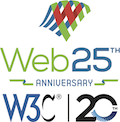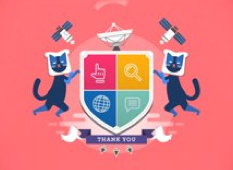HTML5 is a W3C Recommendation
28 October 2014 | Archive
 The HTML Working Group today published HTML5 as W3C Recommendation. This specification defines the fifth major revision of the Hypertext Markup Language (HTML), the format used to build Web pages and applications, and the cornerstone of the Open Web Platform.
The HTML Working Group today published HTML5 as W3C Recommendation. This specification defines the fifth major revision of the Hypertext Markup Language (HTML), the format used to build Web pages and applications, and the cornerstone of the Open Web Platform.
“Today we think nothing of watching video and audio natively in the browser, and nothing of running a browser on a phone,” said Tim Berners-Lee, W3C Director. “We expect to be able to share photos, shop, read the news, and look up information anywhere, on any device. Though they remain invisible to most users, HTML5 and the Open Web Platform are driving these growing user expectations.”
HTML5 brings to the Web video and audio tracks without needing plugins; programmatic access to a resolution-dependent bitmap canvas, which is useful for rendering graphs, game graphics, or other visual images on the fly; native support for scalable vector graphics (SVG) and math (MathML); annotations important for East Asian typography (Ruby); features to enable accessibility of rich applications; and much more.
The HTML5 test suite, which
includes over 100,000 tests and continues to grow, is strengthening browser interoperability. Learn more about the Test the Web Forward community effort.
With today’s publication of the Recommendation, software implementers benefit from Royalty-Free licensing commitments from over sixty companies under W3C’s Patent Policy. Enabling implementers to use Web technology without payment of royalties is critical to making the Web a platform for innovation.
Read the Press Release, testimonials from W3C Members, and
acknowledgments. For news on what’s next after HTML5, see W3C CEO Jeff Jaffe’s blog post: Application Foundations for the Open Web Platform. We also invite you to check out our video Web standards for the future.
W3C Launches Web Payments Initiative
15 October 2014 | Archive
W3C announced today a new Web Payments
Initiative to integrate payments seamlessly into the Open Web
Platform. W3C calls upon all industry stakeholders –banks,
credit card companies, governments, mobile network operators, payment
solution providers, technology companies, retailers, and content
creators– to join the new Payments Interest Group
and leverage the unique ability of the Web to bridge ecosystem
diversity and reach users everywhere, on any device. The result will
be new business opportunities, an improved user experience for online
transactions, reduced fraud, and increased interoperability among
traditional solutions and future payment innovations. Read the full press release and testimonials from W3C
Members, including Bloomberg, Gemalto, GRIN Technologies,
Ingenico Group, NACS, Rabobank, and Yandex.
W3C Turns 20
1 October 2014 | Archive
 This month W3C celebrates its 20th anniversary. In a 1994 press release about the launch of W3C, Director Tim Berners-Lee explained, “The decision to form the consortium came at the urging of many firms investing increasing resources into the Web, whether in creation of software products, selling information, or for sharing information within their own companies, with business partners and the public at large.” Twenty years on, the W3C community is actively building an Open Web Platform for application development that has the unprecedented potential to enable developers to build sophisticated interactive experiences that are available on any device. Pursuing a vision of one Web available to all, 400 Members, thousands of individuals in Working and Interest Groups, nearly 4500 people in Community and Business Groups, and many more subscribed to public mailing lists power today’s W3C community. W3C thanks all of you for 20 years of creating, implementing, and supporting open standards for the Web.
This month W3C celebrates its 20th anniversary. In a 1994 press release about the launch of W3C, Director Tim Berners-Lee explained, “The decision to form the consortium came at the urging of many firms investing increasing resources into the Web, whether in creation of software products, selling information, or for sharing information within their own companies, with business partners and the public at large.” Twenty years on, the W3C community is actively building an Open Web Platform for application development that has the unprecedented potential to enable developers to build sophisticated interactive experiences that are available on any device. Pursuing a vision of one Web available to all, 400 Members, thousands of individuals in Working and Interest Groups, nearly 4500 people in Community and Business Groups, and many more subscribed to public mailing lists power today’s W3C community. W3C thanks all of you for 20 years of creating, implementing, and supporting open standards for the Web.
Please join us to discuss the future of the Web and W3C at the W3C 20th Anniversary Symposium and Gala Dinner on 29 October in Santa Clara, California. Register today while seats remain. Follow the event online with #W3C20.










